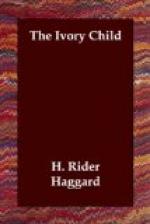“Give me the rifle,” I answered, taking off my greatcoat.
He handed it me with a bow.
“Mind what you are about,” growled Charles. “That there thing is full cocked and ’air-triggered.”
I withered, or, rather, tried to wither him with a glance, but this unbelieving keeper only stared back at me with insolence in his round and bird-like eyes. Never before had I felt quite so angry with a menial. Then a horrible doubt struck me. Supposing I should miss! I knew very little of the manner of flight of English wood-pigeons, which are not difficult to miss with a bullet, and nothing at all of these particular rifles, though a glance at them showed me that they were exquisite weapons of their sort and by a great maker. If I muffed the thing now, how should I bear the scorn of Charles and the polite amusement of his noble master? Almost I prayed that no more pigeons would put in an appearance, and thus that the issue of my supposed skill might be left in doubt.
But this was not to be. These birds came from far in ones or twos to search for their favourite food, and the fact that others had been scared away did not cause them to cease from coming. Presently I heard Charles mutter:
“Now, then, look out, guv’nor. Here’s your chance of teaching his lordship how to do it, though he does happen to be the best shot in these counties.”
While he spoke two pigeons appeared, one a little behind the other, coming down very straight. As they reached the opening in the ilex grove they hovered, preparing to alight, for of us they could see nothing, one at a distance of about fifty and the other of, say, seventy yards away. I took the nearest, got on to it, allowing for the drop and the angle, and touched the trigger of the rifle, which fell to my shoulder very sweetly. The bullet struck that pigeon on the crop, out of which fell a shower of acorns that it had been eating, as it sank to the ground stone dead. Number two pigeon, realizing danger, began to mount upwards almost straight. I fired the second barrel, and by good luck shot its head off. Then I snatched the other rifle, which Charles had been loading automatically, from his outstretched hand, for at that moment I saw two more pigeons coming. At the first I risked a difficult shot and hit it far back, knocking out its tail, but bringing it, still fluttering, to the ground. The other, too, I covered, but when I touched the trigger there was a click, no more.
This was my opportunity of coming even with Charles, and I availed myself of it.
“Young man,” I said, while he gaped at me open-mouthed, “you should learn to be careful with rifles, which are dangerous weapons. If you give one to a shooter that is not loaded, it shows that you are capable of anything.”
Then I turned, and addressing Lord Ragnall, added:
“I must apologize for that third shot of mine, which was infamous, for I committed a similar fault to that against which I warned you, sir, and did not fire far enough ahead. However, it may serve to show your attendant the difference between the tail of a pigeon and an oak leaf,” and I pointed to one of the feathers of the poor bird, which was still drifting to the ground.




